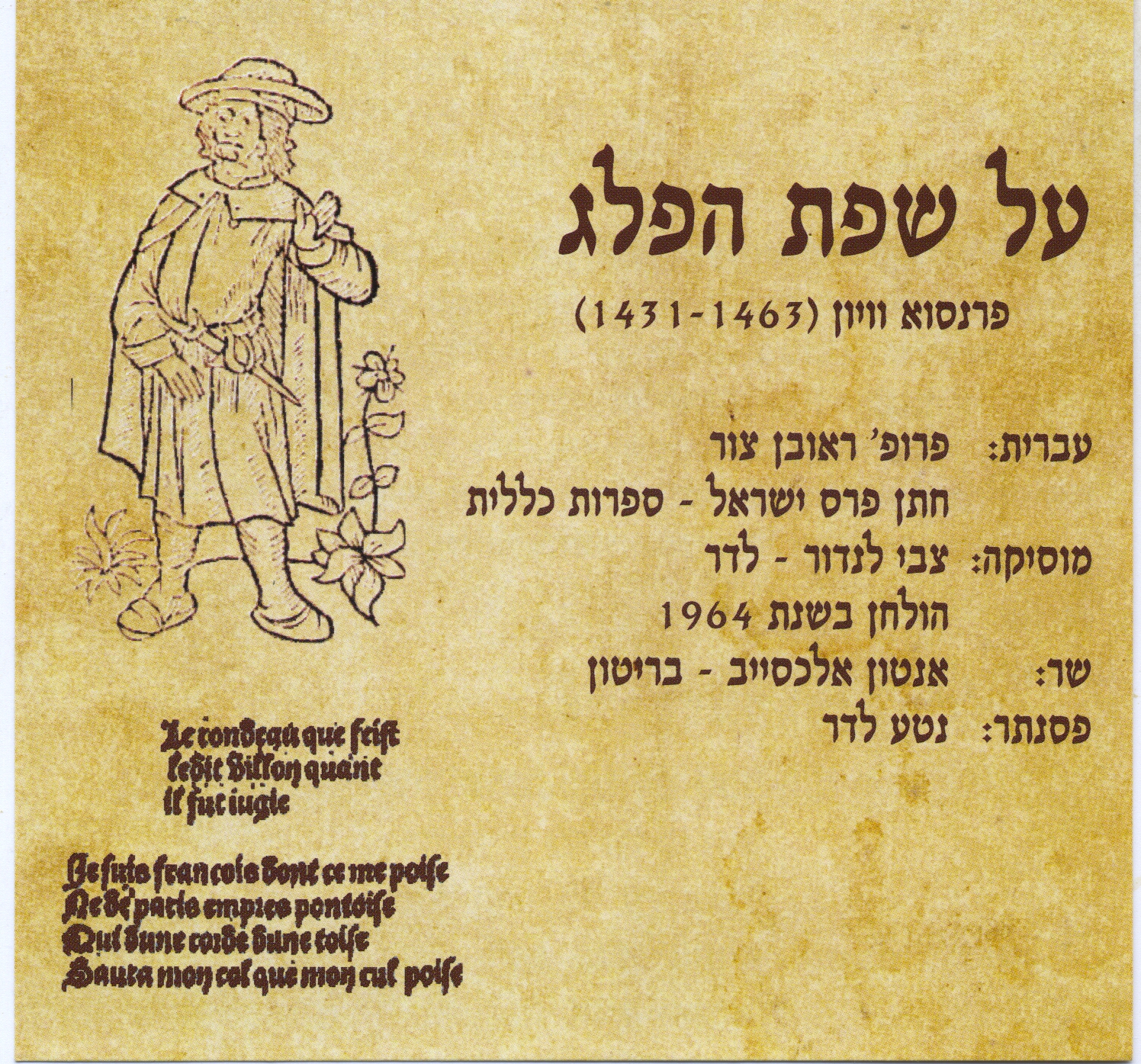
Ballade du concours de Blois
par François Villon
This page celebrates Villon's famous ballade of paradoxes “Je meurs de seuf auprés de la fontaine”. It contains the original French text, a literal English translation by Galway Kinnell, and Reuven Tsur's Hebrew translation, from his 1964 volume of Villon translations Danse Macabre.
Zvi Ladar (Landwer) set the Hebrew version to music back in 1964, performed at the launching event of the volume (see music notes at the end of the page).

Ballade du concours de Blois
|
Je meurs de seuf auprés de la fontaine, Chault comme feu et tremble dent a dent, En mon pays suis en terre loingtaine, Lez ung brasier frisonne tout ardent, Nu comme ung ver, vestu en president, Je riz en pleurs et attens sans espoir, Confort reprens en triste desespoir, Je m’esjoys et n’ay plasir aucun, Puissant je suis sans force et sans pouoir, Bien recueully, debouté de chascun. Riens ne m’est seur que la chose incertaine, Obsucur fors ce qui est tout evident, Doubte ne fais fors en chose certaine, Scïence tiens a soudain accident, Je gaigne tout et demeure perdent, Au point du jour diz «Dieu vous doint bon soir ! », Gisant envers j’ay grand paeur de chëoir, J’ay bien de quoy et si n’en ay pas ung, Eschoicte actens et d’omme ne suis hoir, Bien recueully, debouté de chascun. De rien n’ay soing, si mectz toute m’atayne D’acquerir biens et n’y suis pretendent, Qui mieulx me dit, c’est cil qui plus m’actaine, Et qui plus vray, lors plus me va bourdent, Mon ami est qui me faict entendent D’ung cigne blanc que c’est ung corbeau noir, Et qui me nuyst, croy qu’i m’ayde a pourvoir, Bourde, verté, au jour d’uy m’est tout ung, Je retiens tout, rien ne sçay concepvoir, Bien recueully, debouté de chascun. Prince clement, or vous plaise sçavoir Que j’entens moult et n’ay sens ne sçavoir; Parcïal suis, a toutes loys commun. Que sais je plus ? Quoy ! les gaiges ravoir, Bien recueully, debouté de chascun |
I die of thirst beside the fountain I’m hot as fire, I’m shaking tooth on tooth In my own country I’m in a distant land Beside the blaze I’m shivering in flames Naked as a worm, dressed like a president I laugh in tears and hope in despair I cheer up in sad hopelessness I’m joyful and no pleasure’s anywhere I’m powerful and lack all force and strength Warmly welcomed, always turned away. I’m sure of nothing but what is uncertain Find nothing obscure but the obvious Doubt nothing but the certainties Knowledge to me is mere accident I keep winning and remain the loser At dawn I say “I bid you good night” Lying down I’m afraid of falling I’m so rich I haven’t a penny I await an inheritance and am no one’s heir Warmly welcomed, always turned away. I never work and yet I labor To acquire goods I don’t even want Kind words irritate me most He who speaks true deceives me worst A friend is someone who makes me think A white swan is a black crow The people who harm me think they help Lies and truth today I see they’re one I remember everything, my mind’s a blank Warmly welcomed, always turned away. Merciful Prince may it please you to know I understand much and have no wit or learning I’m biased against all laws impartially What’s next to do? Redeem my pawned goods again! Warmly welcomed, always turned away. |
.jpg)
המוסיקה לשיר על שפת הפלג מאת צבי לדר:
האלמנט השליט בבלדה הוא הניגוד, הפרדוקס, והמוסיקה מנסה להעביר זאת באמצעים רבים ושונים, הלקוחים מתקופות שונות ומאוחדים ביצירה באופן אקלקטי, תופעה המזכירה את רב-הסגנוניות ביצירות רבות בנות זמננו. בין האמצעים השונים ניתן למנות מרווחים דיסוננטיים, כגון הטריטון, המאפיין בין היתר את המודוס הלידי של ימי הביניים, תקופת חיבורה של הבלדה. אך גם שימוש בסולם הטונים השלמים המאפיין את דביסי במאה ה-20, ומולו חצאי טונים הצובעים את היצירה בצבעים אפלים. שינוי מקצבי ומוטיבי מדי שתיים או שלוש שורות, עוזר לא להכנס לתבנית צפוייה מראש ושומר על מתח, בשל הפרדוקס המתמיד. גלן גולד אמר פעם בריאיון, שתמיד היה מוקסם מהאפשרויות של הקונטרפונקט, כיוון שהוא מציג דברים שונים הקורים בו זמנית. כאן הקונטרפונקט קיים כפשוטו, כקונטרפונקט מלודי באכי, אך גם בצורה מתוחכמת, כשילוב של צורות מוסיקליות מסורתיות עם מצלולים ברוח המאה ה-20. מידת הסטיה מהטונליות היא עוד גורם משתנה, התורם לגיוון ולהפתעה, וכך לרעיון הפרדוקס של ויון.
נטע לדר
The music for the Ballade, by Zvi Ladar:
Paradox being the essence of Villon’s ballade, the music seeks to convey this idea in a variety of musical ways, typical of different areas and eclectically unified in the piece, reminding the listener of the polystylicity in 20th century repertoire.
Among the different musical means there are dissonant intervals like the the tritone, typical of the lydian church mode in the Middle Ages, hence contemporary of the ballade’s era. But on the other hand one can detect the use of the whole note scale, familiar with Debussy, as opposed to chromatic (half tone) passages which shade the music with dark, mysterious colours. In order not to give in to predictability and maintain the tension, motivic and rhythmical changes often occur; hence the contrast, both in text and music.
The amount of diversion from tonality is another unstable element, creating unpredictable harmonious processes, thus contributing to the interest and the variety vital to the Paradox idea in Villon’s “Ballade pour le Concours de Blois”.